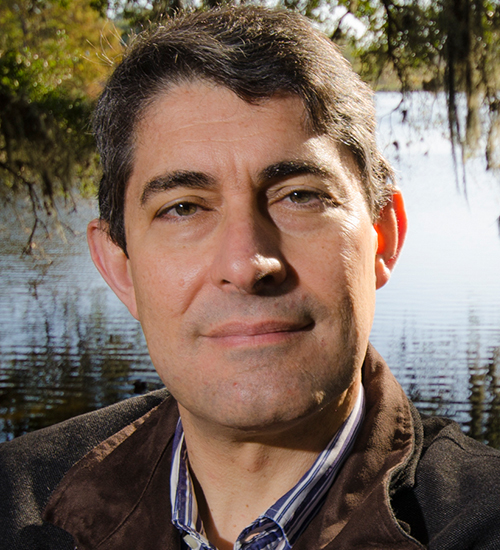Dr. Rafael Muñoz-Carpena
Distinguished Professor, Surface, Vadose Zone, Groundwater Hydrology, Environmental Modeling
Fellow, American Society of Agricultural and Biological Engineers
Fellow, American Association for the Advancement of Science
Rafael Muñoz-Carpena is what you might call one of the new hydrologists. In addition to traditional hydrology, studying how water moves through the environment, he incorporates ecological factors, such as the impact of water use on plants, animals, and the local environment, and uses computer modeling to quantify effects and create mathematically based management tools.
Management of Florida's water resources requires what Muñoz-Carpena describes as a "systems approach," which takes into account all the relevant factors when considering land and water use issues, rather than looking at development in isolation. Impacts of hydrological changes by humans can be measured in the environment. Each natural area of Florida -- wetlands, prairies, dune communities, rivers, etc. -- can be characterized by valuable ecosystem components or VEC. In each one of these natural habitats, there are specific indicator species that can tell us how healthy the habitat is. Among the VECs for a specific habitat, there could be an insect, a bird, a plant, or some other species. By observing the changes in the populations of these creatures, positive and negative impacts can be assessed.
In discussing water resources, Muñoz-Carpena refers to the gap between what we think we have and what we really have. In Florida, water seems to be everywhere, but that water is part of a natural system that is at risk in many areas of the state because of intense development. Muñoz-Carpena cites the "preference for local sources" directive from the state government as one hopeful sign that Florida will take positive steps toward sustainable development by insisting that development can only proceed when the water resources to support that development are locally available. This can prevent decisions from being made that have local benefits at the cost of distant environments.
As part of his work, Muñoz-Carpena conducts formal analyses of the variability or uncertainty in his mathematical models. This can involve using high-performance computers to run the models many thousands of times. For his own work and that of his many students, Muñoz-Carpena insists on a strong scientific basis and an attitude of scientific inquiry. He stresses that he is not a scientist whose focus is how nature works; he is an engineer who wants to know what we can do with the knowledge the scientist reveals.

Contact Information
352-294-6747
Office:
287 Frazier Rogers Hall
Mailing Address:
P.O. Box 110570
Gainesville, FL 32611-0570
-
Teaching
- ABE3212C: Land and Water Resources Engineering
- ABE5643C: Biological Systems Modeling (Fall)
- ABE6254: Simulation of Ag Watershed Systems
- ABE6265: Vadose Zone Water & Solute Transport Modeling
- ABE6649C: Advanced Biological Systems Modeling (Spring)
-
Research
Departmental Research Areas:
- Land and Water Resources Engineering
Research Focus:
-
Education
- Ph.D. North Carolina State University, Department of Biological and Agricultural Engineering, 1993
- M.Sc. & B.Sc., Ingeniero Agrónomo Superior, Universidad Politécnica de Madrid, Spain, 1989
-
Professional Experience
- 2011 - Present
Professor, Department of Agricultural and Biological Engineering, University of Florida - 2019-2020
Professor in Residence, Public University of Navarre (UPNA), Spain - 2018 (May-August)
Interim Chair, Agricultural & Biological Engineering, University of Florida - 2010 - 2011
Professor in Residence, CEMAGREF (now Irstea), Lyon, France - 2006 - 2011
Associate Professor, Department of Agricultural and Biological Engineering, University of Florida - 2005 - 2006
Assistant Professor, Department of Agricultural and Biological Engineering, University of Florida - 2001 - 2005
Assistant Professor, UF/IFAS Tropical Research and Education Center, Department of Agricultural and Biological Engineering, University of Florida - 1993 - 2001
Tenured Researcher, Instituto Canario de Investigaciones Agrarias-ICIA, Tenerife, Spain - 1994 - 2001
Adjunct Professor in Hydrology (Agro-Forest Engineering), Universidad de La Laguna, Tenerife, Spain
- 2011 - Present
- Publications
-
Awards and Honors
- 2022 ASABE John Deere Gold Medal
- 2021 Outstanding Alumni Award, Biological & Agricultural Engineering at NC State University
- University Term Professor, 2017-2020
- 2020 AAAS Fellow (American Association for the Advancement of Science)
- 2018 UF/IFAS Award of Excellence for Graduate Research: Best Doctoral Dissertation Advisor, Dr. Natalie Nelson, Quantifying the spatiotemporal importance of fresh-brackish water quality drivers using data analytics and models.
- 2018 ASABE Standards Development Award, EP621 Jun2017, Guidelines for Calibrating, Validating and Evaluating Hydrological and Water Quality Models
- UF/IFAS High Impact Research Publication Award. Science Adv. (AAAS), DOI: 10.1126/sciadv.1601272, 2017
- UF Postdoc Mentoring Award, UF Office of Postdoctoral Affairs, 2016
- Distinguished Achievement Award, American Society of Agricultural & Biological Engineers (ASABE) - Florida Section, 2016
- Fellow, American Society of Agricultural and Biological Engineers (ASABE), 2015
- Corresponding Member (”académico”), Royal Academy of Engineering of Spain, 2015
- ASABE ADS/Hancor Soil and Water Engineering National Award, 2015
- Fellow, UF Water Institute, University of Florida, 2013
- National Postdoctoral Association Mentor Award, 2013
- International Educator of the Year Award, UF/IFAS, 2013
- Best Paper Award, Environmental Water Resources Institute (EWRI), ASCE., 2013
- Research Professorship Award, University of Florida Foundation, 2011
- Junior Faculty Award of Merit, Gamma Sigma Delta, 2009
- Special Recognition, American Society of Agricultural & Biological Engineers (ASABE) - Florida Section, 2009
- International Achievement Award, Institute of Food and Agricultural Sciences, University of Florida, 2008
- International Educator Award, UF International Center, 2008
- UF/IFAS LEAD Certificate, 2008
- UF/CALS Teacher’s College Certificate, 2008
- Chair, ASABE SW-21 (Hydrology) Section, 2007-2008
- USDA-Foreign Agricultural Service Certificate of Appreciation, 2003
- Paper of ASAE Award, Hydrology Mini-Symposium, 1999
- Alpha Epsilon (Agricultural Engineering Honor Society)
- Gamma Sigma Delta (International Honor Society of Agricultural Sciences)
- The Honor Society of Phi Kappa Phi
-
Other Professional Activities
- American Society of Agricultural and Biological Engineers - SW21 Hydrology Group
- American Geophysical Union (AGU)
- Colegio Oficial de Ingenieros Agrónomos de Centro y Canarias (Spanish Society of Professional Agricultural Engineers)
- AERYD (Spanish Society of Irrigation and Drainage Engineering)
